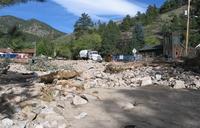-
The likelihood of a California Big One “uncomfortably high”: Experts

Research on the San Andreas fault has shown that the average time between surface-rupturing earthquakes is about a century. Experts say that these findings are a call to action. The last two “big ones” on the San Andreas fault — in 1906 in Northern California and 1857 in Southern California — occurred more than a century ago. There are several ways to calculate the probability of a similar earthquake, but they all give uncomfortably high results. A large earthquake is likely in our lifetime. A magnitude 7.8 earthquake is realistic, one expert says. “Our data show that similar earthquakes happened here in the not-too-distant past. As Shakespeare said, past is prologue. However, past large earthquakes on the San Andreas fault affected very few people. Now millions are at risk.”
-
-
Open data sources can help localities prepare for disasters
States and local governments must improve their use of open-data sources to prepare for disasters, according to a trio of emergency management experts from academia, government, and the private sector. Experts agreed that public data reveals an increasing need for infrastructure upgrades in U.S. cities, but local governments tend to adopt short-term measures over long-term protections.
-
-
As sea level rises, coastal communities brace for more frequent, destructive tidal flooding
Today, many coastal communities are seeing more frequent flooding during high tides. As sea level rises higher over the next fifteen to thirty years, tidal flooding is expected to occur more often, cause more disruption, and even render some areas unusable — all within the time frame of a typical home mortgage. An analysis of fifty-two tide gauges in communities stretching from Portland, Maine to Freeport, Texas shows that most of these communities will experience a steep increase in the number and severity of tidal flooding events over the coming decades, with significant implications for property, infrastructure, and daily life in affected areas. The report warns that given the substantial and nearly ubiquitous rise in the frequency of floods at these fifty-two locations, many other communities along the East and Gulf Coasts will need to brace for similar changes.
-
-
California needs $54 million to deploy ShakeAlert earthquake warning system
Officials in California need $54 million fully to implement the ShakeAlert earthquake warning system, according to a scientist with the U.S. Geological Survey (USGS).ShakeAlert detects earthquakes using the California Integrated Seismic Network of roughly 400 ground motion sensors which identify primary waves (P-waves) as they move through the Earth at almost twice the speed of the earthquakes’ destructive S-waves, which shake the ground.When an earthquake is detected, ShakeAlert informs emergency management officials of the quake’s epicenter, and a computer-generated voice counts the remaining time before shaking occurs.
-
-
Uncertainty over terrorism insurance act’s renewal upsets industry
The Terrorism Risk Insurance Act (TRIA) is set to expire at the end of this year unless Congress renews the program, which will likely include reforms required by House Republicans. Congress passed TRIA in 2002 after the 9/11 attacks to encourage insurance companies to continue terrorism coverage as part of commercial policies after many feared that doing so would lead to greater financial loss should another terror attack occur.
-
-
Scientist reveals Chelyabinsk meteorite fall’s seismo-ionospheric effects
The meteorite which hit the Russian city of Chelyabinsk on 15 February 2013 was the cause of a large number of dynamic ionospheric, atmospheric, and seismic phenomena. Its explosion created panic among local residents and about 1,500 people were injured seriously enough to seek medical treatment. All of the injuries were due to indirect effects rather than the meteor itself, mainly from broken glass from windows that were blown in when the shock wave arrived, minutes after the superbolide’s flash.
-
-
Boston developers continue to build on the waterfront, but take account of sea level rise
The threat of rising sea levels has not discouraged property developers and buyers in Boston from investing in multi-million dollar condos located along the city’s waterfront. Boston developers are keeping copies of key building records off-site in case electricity shuts down during a storm surge. Some developers are moving mechanical systems from the basements of high rises to several stories above ground, to ensure power and critical systems are intact during a flood.
-
-
2013 Colorado Front Range flood: Debris-flow a major hazard

Between 9 and 13 September 2013, more than 1,100 debris flows occurred in an area of about 3,400 square kilometers in Colorado’s Front Range, most of which were triggered by two periods of intense rainfall. The massive flooding, and the concomitant landslides and debris flows, caused widespread damage across the Front Range.
-
-
The Big One will have frightening consequences for Los Angeles: Scientists
Scientists cannot accurately predict when California’s next massive earthquake – or, the Big One – will strike, but they can predict the effects, and it is frightening. Scientists with the U.S. Geological Survey (USGS) say these effects will include powerless rescue services, widespread fire damage, and no fresh water for months on end. The 1994 Northridge Earthquake was the region’s the last mega-quake, but scientists say that “When we have the San Andreas earthquake, that earth fault will probably be about 20 to 30 times larger than the fault that produced the Northridge earthquake [which still resulted in $20 Billion in damages].”
-
-
California communities running out of water
Since January, a number of California communities in the Central Valley have been experiencing such extreme drought that they have been placed on a “critical water systems” list — a ranking indicating that the areas could run completely dry within sixty days. Many of these areas have had wells dried up since July.
-
-
Better planetary vital signs should replace 2° C warming goal as targets for climate action
As climate instability increases across the planet, limiting global surface air temperature increase above pre-industrial levels to an average of 2° C (3.6° F) has become a popular metric for success in the public eye. Two researchers argue, however, that the goal is a misleading one. Though it is a relatively tangible concept to appreciate, the standard does not correlate well to prescribed government actions such as limiting fossil fuel use or establishing carbon markets. “Scientifically, there are better ways to measure the stress that humans are placing on the climate system than the growth of average global surface temperature — which has stalled since 1998 and is poorly coupled to entities that governments and companies can control directly,” the researchers say.
-
-
California agriculture faces greatest water loss ever seen
California produces nearly half of U.S.-grown fruits, nuts, and vegetables, and nearly a quarter of the nation’s milk and cream. Across the nation, consumers regularly buy several crops grown almost entirely in California, including tomatoes, carrots, broccoli, almonds, walnuts, grapes, olives, and figs. Researchers show that California agriculture is weathering its worst drought in decades due to groundwater reserves, but the nation’s produce basket may come up dry in the future if it continues to treat those reserves like an unlimited savings account.
-
-
California crippling drought linked to climate change: Scientists
The extreme atmospheric conditions associated with California’s crippling drought are far more likely to occur under today’s global warming conditions than in the climate that existed before humans emitted large amounts of greenhouse gases. Researchers used a novel combination of computer simulations and statistical techniques to show that a persistent region of high atmospheric pressure hovering over the Pacific Ocean that diverted storms away from California was much more likely to form in the presence of modern greenhouse gas concentrations.
-
-
Los Angeles revises rule requiring flat rooftops for skyscrapers
For more than forty years, the building code in Los Angeles required skyscrapers to have flat roofs in order to facilitate helicopter landing in cases of emergency. Now, however, with newer technological advances and techniques that enable Angelinos to be safe during an emergency, the flat-roof code is seen as outdated, and it was changed on Monday. Instead of helicopter pads, skyscraper designers will now focus on other safety features, including special elevators for fire fighters, special exit stairwells, advanced sprinkler systems, and video surveillance technologies.
-
-
L.A. considering first responses to the inevitable Big One
Often referred to as the “Big One,” the inevitable cataclysmic earthquake that will eventually strike at the San Andreas Fault throughout the city of Los Angeles is expected to be incredibly destructive. According to seismologists, it is no longer a question of “if,” but more just “when.” Preparedness experts identify several key parts of the greater Los Angeles infrastructure that will need to have firm response plans in place to deal with the fallout of a major disaster, specifically transportation and communication —– the two things needed to coordinate and react to everything else.
-
- All
- Regional
- Water
- Biometrics
- Borders/Immig
- Business
- Cybersecurity
- Detection
- Disasters
- Government
- Infrastructure
- International
- Public health
- Public Safety
- Communication interoperabillity
- Emergency services
- Emergency medical services
- Fire
- First response
- IEDs
- Law Enforcement
- Law Enforcement Technology
- Military technology
- Nonlethal weapons
- Nuclear weapons
- Personal protection equipment
- Police
- Notification /alert systems
- Situational awareness
- Weapons systems
- Sci-Tech
- Sector Reports
- Surveillance
- Transportation
Advertising & Marketing: advertise@newswirepubs.com
Editorial: editor@newswirepubs.com
General: info@newswirepubs.com
2010-2011 © News Wire Publications, LLC News Wire Publications, LLC
220 Old Country Road | Suite 200 | Mineola | New York | 11501
Permissions and Policies
Editorial: editor@newswirepubs.com
General: info@newswirepubs.com
2010-2011 © News Wire Publications, LLC News Wire Publications, LLC
220 Old Country Road | Suite 200 | Mineola | New York | 11501
Permissions and Policies
